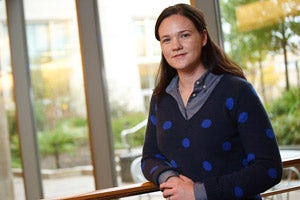Graduating from the U.S. Military Academy at West Point in 2007, Alexandra Mealer J.D./M.B.A. ’16 wanted a career path that would challenge her intellect.
She became a specialist in defusing bombs.
“As opposed to other things that were more about how strong you are, this was about how smart you are,” says Mealer, who, as an Army captain, spent 14 months in Afghanistan, first as a platoon leader in Kandahar, then as a company commander in Bagram responsible for 600 soldiers and civilian contractors. “You’re trying to take things apart, having to make quick decisions as safely as possible.” There was an immediate satisfaction to the work, she adds. “We spent a lot of time with IEDs (Improvised Explosive Devices) in villages where people live. When you remove it safely, you get immediate feedback, which is nice.”
Perhaps surprisingly, the military’s Explosive Ordnance Disposal (EOD) program has many more applicants than available slots, with only the best accepted. This year, Harvard Law School has at least two of its graduates among its ranks. Like Mealer, U.S. Navy Lt. Cmdr. Gregory Saybolt LL.M. ’13, who spent two years in Bahrain as an EOD specialist, enjoyed deploying the brainpower that the job requires. His unit went into Iraq several times, diving to search rivers and dams for underwater explosives. “It was a good mix of tough physical and mental challenges,” says Saybolt, a certified Navy diver and a lawyer in the Judge Advocate General’s Corps (JAG). After earning his LL.M., he will serve aboard an aircraft carrier advising on the international law of the sea.
This year’s 1L class at HLS includes 16 military veterans. There are also nine 2Ls, six 3Ls, and three LL.Ms at HLS with records of military service. Thirteen are attending through the Yellow Ribbon program, through which the U.S. Department of Veterans Affairs matches what a law school offers to pay for a veteran’s tuition and expenses. HLS is one of very few schools making the maximum commitment—50 percent—which means, with the V.A.’s match, these veterans attend for free. Others are funding their HLS educations through the G.I. Bill and student loans. The three Navy JAG lawyers in the LL.M. program each receive a scholarship from HLS equivalent to the amount covered by the School under the Yellow Ribbon Program; their remaining costs are covered by the U.S. Navy.
Dean Martha Minow describes the veterans and military students as a “simply terrific” group who add a great deal to the school. “To a person, the military veterans and individuals in active service who are among our students bring outstanding qualities of leadership, focus, and perspective to their work and to the entire community,” says Minow. “They also elevate awareness about the legal and policy issues affecting veterans, the significance of law in contemporary warfare, and the significance of energy policy and other substantive concerns to military priorities.”
Lauren Gore ’15, like Mealer a 2007 graduate of West Point, was chosen, twice, to represent the 1st Infantry Division in the Best Ranger Competition, a grueling 60 continuous hours of running, swimming, airborne jumps, marksmanship, and more that takes place each year. “They basically take skills from the Army Common Skills Task Manual and have you perform them under stress—not too much unlike law school,” says Gore, who deployed to Iraq for seven months in 2009, serving as second in command of a 130-man Light Infantry Company, conducting counterinsurgency and capacity building efforts. Witnessing Iraq transform to a more functional society motivated him to go to law school. “I was really inspired by that whole process, that something like the law, which is so nebulous, could be so powerful as to literally change the lives of the people of Iraq,” he says. “I wanted to learn more about it.”
Saybolt joined the Navy after graduating from the University of Pennsylvania with a degree in bioengineering and served for two years aboard the U.S.S. Ardent, a minesweeper based in Bahrain, before his bomb disposal training. On his second tour in the Middle East, his unit participated in a month-long recovery mission that he regards as one of the high points of his career. An American serviceman crossing the Tigris River fell out of a boat and, unable to remove his heavy equipment, drowned; an Iraqi policeman died trying to save him. Two American soldiers in a helicopter, searching for those bodies, hit power lines at night, crashed, and died. Saybolt led a team of eight Navy divers who, along with an Army team, eventually recovered the four bodies.
“It was a totally good feeling,” says Saybolt, who after returning to the U.S. attended the University of San Diego School of Law, then deployed to Afghanistan to advise a Navy SEALS unit on rules of war. “I was able to tell my team that they were participating in an unadulterated good, to help those families by bringing their sons home.”
Mealer served five years total in the Army; her interest in the law grew during her time in Afghanistan, where she assisted in prosecutions against bombers and bomb-makers. A joint law-business degree will leave her options open, she explains: she’s drawn both to national security work and to the business world. Gore says he is considering a career in the corporate world but will continue to do public service in one form or another. “I definitely want to make sure that my passion to help people remains at forefront of my mind,” he says, “regardless of what I do.”
—Elaine McArdle
